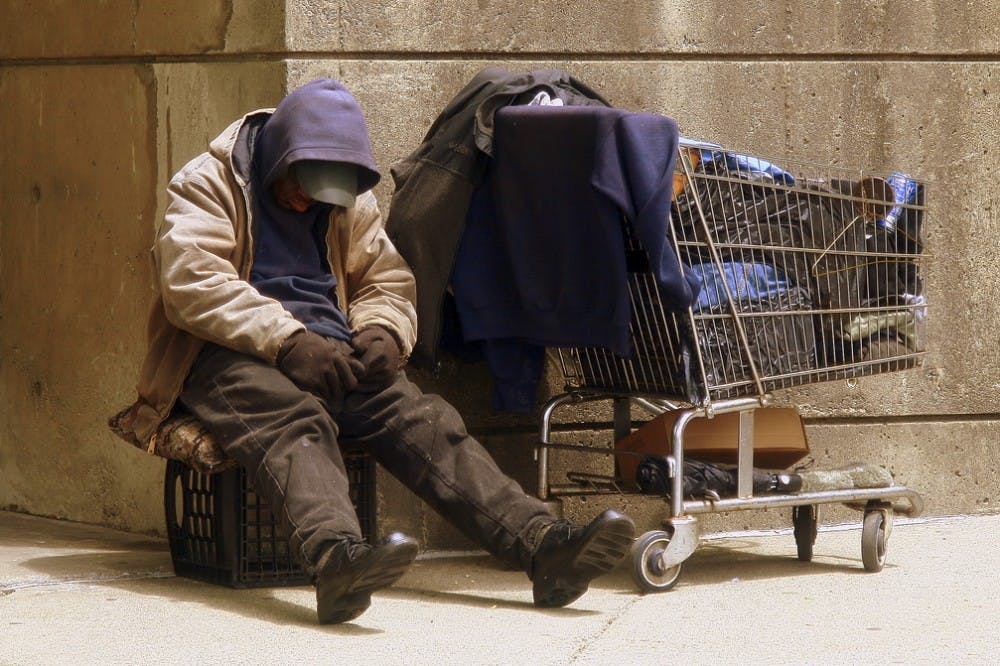
Professor Dennis Culhane has been studying homelessness and its two categories, crisis and chronic, and has conducted valuable research in ending homelessness across the nation and the globe. | Courtesy of Matthew Woitunski/Wikimedia Commons
In the United States, more than 560,000 people were homeless on a single night in January 2015, according to Project HOME, a Philadelphia-based advocacy organization. But according to one Penn professor, ending homelessness is possible.
School of Social Policy & Practice and Perelman School of Medicine professor Dennis Culhane specializes in homelessness and assisted housing policy. He has been studying homelessness for 25 years and has conducted valuable research in ending homelessness across the nation and the globe. He says newer approaches to ending homelessness have helped mitigate the problem over the years.
Culhane’s research breaks down homelessness into two categories: crisis and chronic.
80 percent of cases are crisis homelessness, which is more transient and can be caused by factors like job loss, conflict with family, divorce or incarceration. It usually lasts for 30 days and once people leave, they normally don’t fall back into homelessness.
Chronic homelessness can last for years at a time. Those who are chronically homeless have significant behavioral health disabilities, whether it be mental illness, substance abuse addiction or other problems or need for organized assistance to escape homelessness.
“The second phase [of our work] has been to design interventions that are specific to those two groups,” Culhane said. “We’ve developed rapid rehousing ... and permanent supported housing intervention for people suffering from chronic homelessness... they each run at about 85 percent effectiveness and are a remarkably low cost to society.”
This new “housing first” approach of fighting homelessness focuses on quickly getting people into stable housing first and then getting them access to mental health services, substance abuse treatment and other support services afterwards. The new approach has been shown to work more effectively than prior programs that required homeless people to go through substance abuse and mental health treatments before going through a long social services process to obtain housing.
The effectiveness of this model has contributed to an overall decline in homelessness, Culhane said — the United States homeless population has dropped by 26 percent since 2010. It has even been replicated in other countries, including Europe, Canada and Australia.
Culhane is currently looking at how to scale these methods further in many diverse contexts and finding ways to fund it. One program that he thinks really demonstrates the country’s potential in ending homelessness is those of the U.S. Department of Veteran’s Affairs. Under the Obama administration, six billion dollars have been spent since 2009 in obtaining affordable housing vouchers and rapid rehousing to fight chronic and crisis homelessness.
Because of this veteran homelessness has dropped by 36 percent since 2010, several states and more than a dozen cities that have ended veteran homelessness, and these areas now have systems in place to resolve new homelessness within 30 days. If the same type of effort was dedicated to ending homelessness among non-veterans as well as veterans, Culhane said, homelessness could be end in eight to ten years.
Culhane’s commitment for the cause stems from his experiences in undergraduate school doing volunteer work with the homeless.
“I had not really encountered that kind of poverty in my upbringing and so it had a very profound impact on me in terms of wanting to think about how to address it,” Culhane said.
Working as a community organizer in graduate school allowed him to gain an even deeper understanding of the problem and the perspective of people facing it.
“It really helped me understand the problem in a way that I don’t think researchers had traditionally thought about homelessness, and it also helps me to think about interventions that would be much more effective than those taken heretofore,” Culhane said.
The Daily Pennsylvanian is an independent, student-run newspaper. Please consider making a donation to support the coverage that shapes the University. Your generosity ensures a future of strong journalism at Penn.
DonatePlease note All comments are eligible for publication in The Daily Pennsylvanian.







